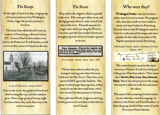
 |
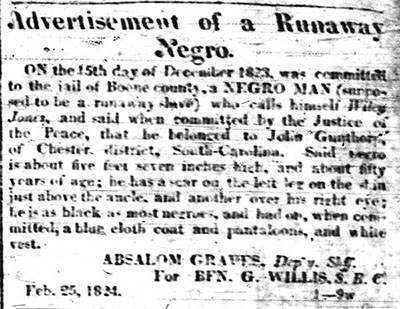 Frankfort Argus, April 7, 1824. |
|||
| An escaped slave ad similar to the ones above for the enslaved Frederick. | ||||
| The WPA Writers Project from the late 1930's conducted a number of interviews with ex-slaves. The only one from Boone County is this one (pdf), but we suggest you take everything it says with a large grain of salt. The Uncle Tom's Cabin references are just flat wrong. | ||||
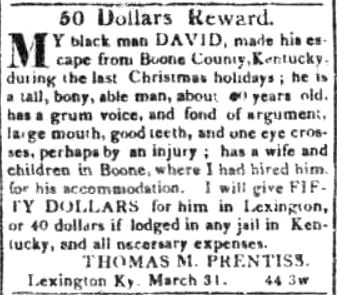 The Western Spy, April 18, 1817 |
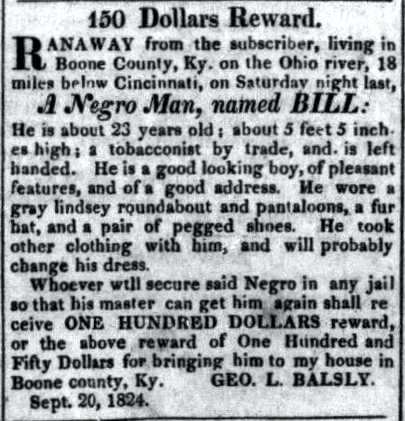 The National Republican and Ohio Political Register, September 21, 1824 |
|||
| Boone County ruffians violently re-take two runaways in Indiana. “. . . the Negro begged them to kill him” | ||||
| Jacob Donovan seeks escaped couple. | Interstate trafficking in slaves frequent headed for the courts. | |||
| Boone County's Mr. Pieffer sold the couple's four year old to Tennessee, making the parents “moody and sulky.” Also, Pieffer's too cheap to offer a reward. | ||||
| Eight out of nine escape, 1845. |  Cincinnati Daily Nonpareil, January 29, 1857 |
|||
| “Three slaves, two men and a woman, belonging to Mr. Piatt, who lives in Kentucky, just across the river from our city, ran away from their owner on Tuesday night of last week. They got as far up in Ohio as Bellefontaine, where they were recognized and arrested by a brother of Mr. Piatt, at whose house they had stopped to get something to eat. A dispatch, stating the arrest, having reached the owner of the slaves, he started, accompanied by five men, for Bellefontaine, but got there in time to be too late to get his property. The abolitionists had taken them by force and sent them on their way, and Mr. P. had to return without their desirable company.” the Independent Press of Lawrenceburg, Indiana, November 10, 1852 | ||||
| “The slaveholders of Boone county held a meeting at Florence on Saturday last, for the purpose of taking such measures as will protect their property from the Abolitionists.” Louisville Daily Courier, February 27,1856 More. | Legal case of a Boone County man named Harper sets legal precedents for slaves, here. | |||
| “A Negro named Scales, who had just been discharged from the Cincinnati Workhouse and had obtained employment on a farm in Boone County, Ky., made brutal assault last Saturday upon the 5-year-old daughter of a poor man named Lundsford. The Negro knew that the child was alone in the house before he entered it. As the Negro threatened to kill her is she told, the little one did not tell her mother until the pain compelled the disclosure. Scales was arrested and with difficulty taken to the Burlington Jail. Last night a mob gathered at Florence, and in wagons and on horseback went to Burlington, broke into the jail, carried the Negro to the woods on the turnpike road, and there hanged him to a tree.” New York Times, September 12, 1885 | ||||
| “A gentleman writes us from Petersburg, Boone County, Kentucky, that the negro boy who murdered Miss Bryant, of Florence, about a month since, was named Joseph, and was the property of Mr. Marcus. The jury valued the fellow at $900.” Cincinnati Daily Enquirer, February 20,1858 | Alleged 1838 escape of Boone County slaves reported here. | |||
| A Brief History of Slavery in Boone County, by Merrill Caldwell, is here. (pdf) | ||||
| Moxley, formerly enslaved and born in Burlington, tells his escape story (pdf). | ||||
| A 1900 story in the Boone County Recorder recounts a slave hunter's “nerve and undaunted courage” in 1840 to re-take Boone County escapees in southern Indiana. | An 1887 account of several escapes by enslaved Boone Countians. | |||
| Sharlot, age 5 and half, sells for $150 in 1822. | Campfield cited for murdering a slave. | |||
| Alarm goes out! Mass slave exit coming! Or not. | ||||
| “Sewell, of Boone county, Ky., was brought before the U. S. Commissioner at Covington, Ky., yesterday, charged with refusing to allow a negro’s to vote at the recent election, while acting as Judge of the election. He denies that he refused an negroes vote, but admits that he told one who asked him if he had a right to vote that he had not understood the laws of Kentucky.” Sacramento Daily Union, August 25, 1870 | “The boy that carried meat to General Washington’s camp is dead, after worrying through 107 years of his troubled life. His name was Uncle Bob Sleet, and he was black and lived in Boone county, Kentucky.” Indianapolis News, March 8, 1872 | |||
Boone County Local History Department posted on Facebook the above image and it's background: The first recorded escape from slavery in Boone County occurred in October 1799. Frank, 26 years old, ran from the farm of Benjamin Craig, on the Ohio River, taking with him a three year old girl named Ginne (presumably his daughter). Frank is described as “about 5’6″, very pleasant countenance, very talkative, pretends to be a Baptist preacher.” Three days later, Phillis, 23 or 24 yrs old, escaped from the farm of Elijah Hogan in Tanner’s Station (Petersburg). Phillis is Frank’s wife (possibly Ginne’s mother) and is described as 5’11” tall, with a yellow complexion. A reward of $25 is offered for their return. Originally from Western Spy and Hamilton Gazette, Cincinnati, October 22, 1799 |
Boone County Local History Department posted this story of Hood on Facebook: On October 5, 1813, Elijah Kirtley placed an ad in the paper for a man named "Mood" who took his freedom from his slaveholder the month before. Mood had been working for Kirtley in his tavern. The ad offered a $20 reward along with a lengthy description. According to Kirtley, Mood had numerous scars, including a brand on his hand (applied after a previous escape attempt). It seems that Mood was quite the character. He was also described as a gambler who is clever and boastful, especially concerning his strength, and “bent on mischief”. Originally from Liberty Hall, Cincinnati, October 5, 1813 |
|||
| Boone County man values his slave over an Irishman, here. | Ads like this are common in post-Civil War African-American newspapers. | |||
“On Sunday last week, about twenty slaves belonging to citizens of Boone county, escaped from
their masters. They belonged to different individuals, and so well was the plan of escape matured, that at last accounts, nothing
had been heard of them. They were without doubt aided by Abolitionists of Ohio or Indiana. The people of Boone county,
a may well be supposed, are justly excited and indignant at this new and heavy outrage upon their rights.”
Both of the above items are the subject of this pamphlet from the Boone County Library:
|
||||
| Alcohol leads to a failed slave escape, here. | Jesse Johnston steals his daughter. From slavery. Here. | |||
| The Boone County Library has a web site devoted to The Underground Railroad in Northern Kentucky. Good stuff. See it here. Note there are tabs, including a tour, with a nifty map. | ||||
| In 1854, nine Boone County slaves attempt an escape to Canada, but don't make it. Story here, and, a different viewpoint on the story is here, and another version here. | Courts were not on the side of slaves, or former slaves. An example. | |||
“The following is a copy of a notice posted up in several parts of Boone County, and sent to many negroes: ‘Notis too Git.—As you hev bin Runin at large for some time, you hed better gather up your duds, and leave for parts unnon, or you will get hell under the shirt, and that by the tenth of next month. Don't fail to go.’” National Anti-Slavery Standard. October 12, 1867 |
“Mr. Hollis, from Boone county., Ky., was in the city yesterday in search of a runaway negro, who has been missing since Monday, and who, he states, he believes to have been enticed away by a book peddler, who was about the premises the Saturday previous. No tidings, however, could be obtained of the absconded chattels and effects, and Mr. Hollis returned home satisfied that he has been passed through the underground railroad.” Louisville Daily Courier, June 23, 1860 | |||
| Several items on slavery in Boone County can be found on this site. | ||||
| Twenty-eight enslaved Boone Countians take the Underground Railroad. Look for “Escape of the 28” at the web site Hamilton Avenue Road to Freedom for a much more detailed account. | ||||
| Boone County man treats mentally disabled white man as one of his slaves, here. It's not a pleasant read. | Two slaves captured. The first day story. The real story. | |||
| Attempted escape at Hamilton, 1851. | Judge arrested for denying the right to vote. | |||
| Yet more Boone County slave escapes, here, and here, and here, and here and here and here. | A Freedman's Bureau (Wikipedia) report of a Boone County incident is here. | |||
| An account of a Boone County slave trader | A short slavery remembrance is here. | |||
| “In spite of paid night patrols, Boone County slaveholders lost large numbers of their slaves to the Underground Railroad of Lawrenceburg, Aurora and Rising Sun, especially after Elijah Anderson moved to Lawrenceburg. In 1852, it was announced that 29 runaways had escaped in three months; in 1853 it was announced that 40 fugitives had escaped from Northern Kentucky.” -uncredited clipping in the Lawrenceburg (Ind.) Public Library | “Judge Menzies of Boone county, Kentucky, an elder in the Presbyterian Church, and a slaveholder, told me that he knew some overseers in the tobacco growing region of Virginia, who, to make their slaves careful in picking the tobacco, that is, taking the worms off, (you know what a loathsome thing a tobacco worm is) would make them eat some of the worms, and others who made them eat every worm missing in the picking.” The Anti-Slavery Examiner, January 1, 1839 | |||
| “Some five or six years ago Joshua Zimmerman, of Boone county, Ky., brought his favorite servant, Billy, with his family, seven or eight in number, to Ohio, where he settled there on a farm he purchased expressly for their benefit. A few days ago, during the holidays, several of his servants (9 in number), and among them some of the remainder of Billy's family, petitioned for leave to make a visit to the Ohio branch of the family, which was granted, the master furnishing them with a pass to cross the river, and the farm horses and wagon. When they arrived at the end of their journey they wrote to their atmosphere of Ohio was more congenial than the corn fields of Kentucky, and that if he would send for his team it would be forthcoming, but they respectfully declined returning his service.” Louisville Daily Courier, January 15, 1851, reprinting an item from the Cincinnati Gazette of the 13th. | ||||
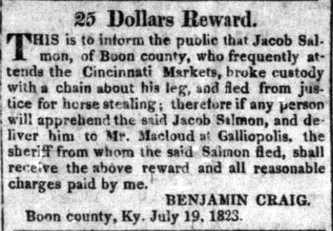
The National Republican And Ohio Political Register, August 12, 1823
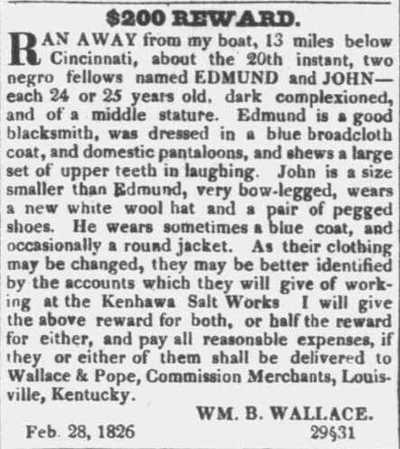
The Liberty Hall And Cincinnati Gazette, February 28, 1826
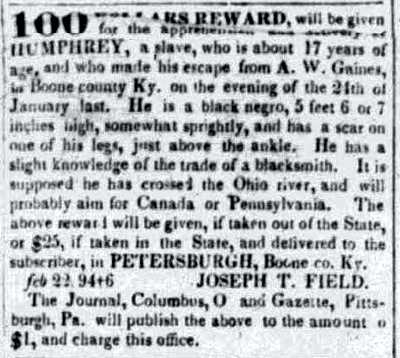
Cincinnati Daily Gazette, February 22, 1833
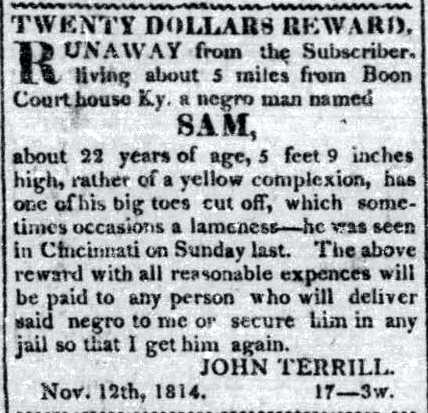
The Western Spy, November 26, 1814
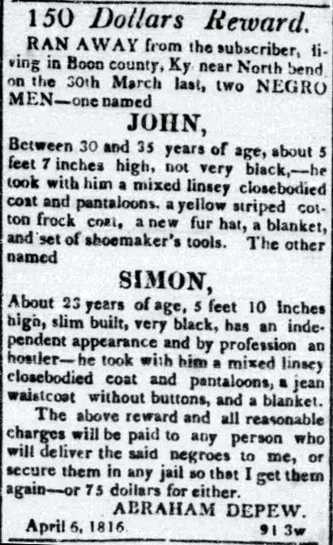
The Western Spy, April 26, 1816
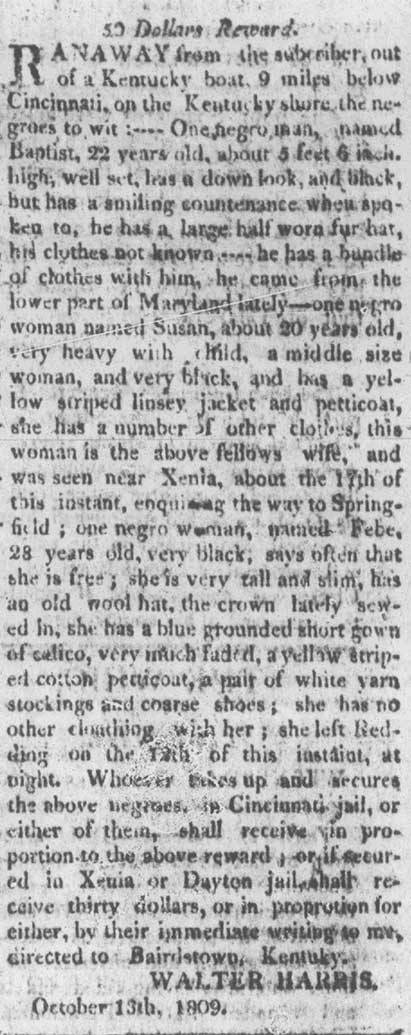
The Whig, November 8, 1809
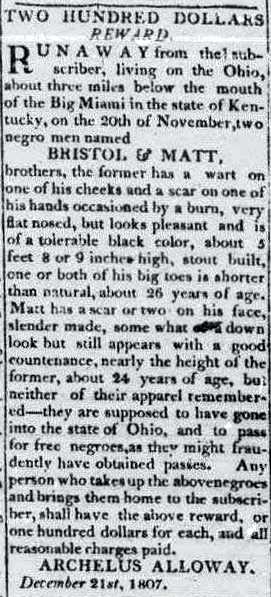 |
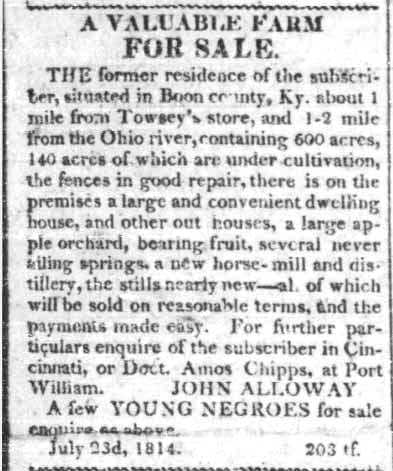 |
|
| Western Spy, December 28, 1807 | Western Spy, July 29, 1814 |
| The folks at the Boone County Public Library put together this nifty pamphlet on the Underground Railroad in Boone County. An enlargement of the map is here. |
||||
![]()




